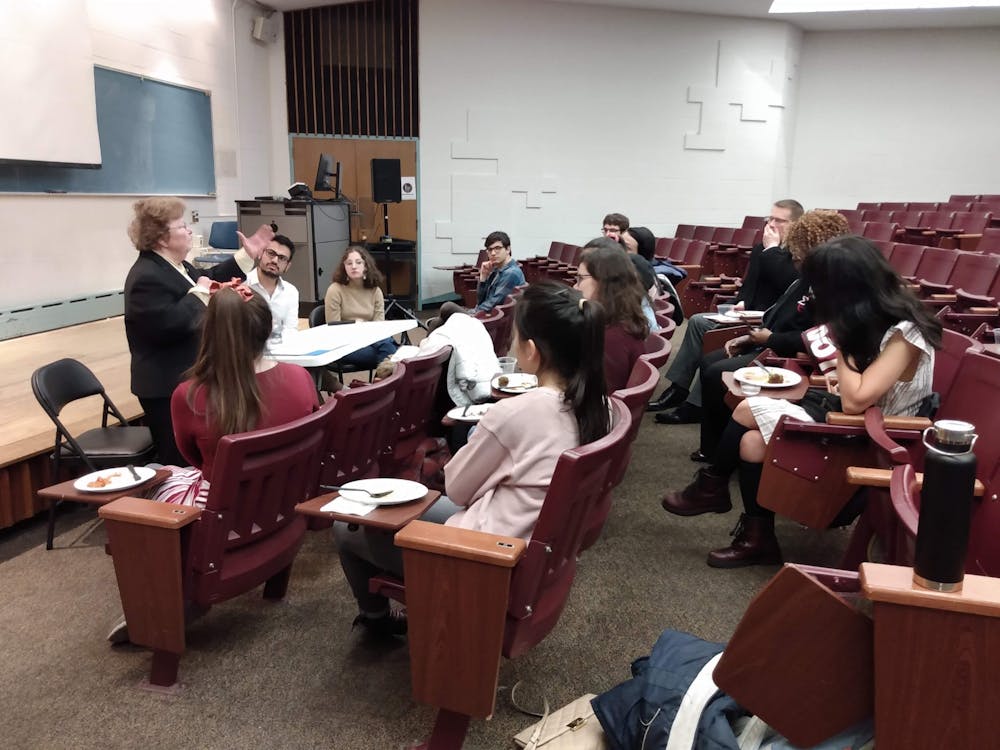Advocates for Disability Awareness (ADA) and Students for Disability Justice (SDJ) hosted an open Q&A with former Maryland Senator Barbara Mikulski to discuss her experiences promoting disability policy on Wednesday night.
Mikulski’s 10 years in the House of Representatives and 30 years in the Senate make her the longest-serving congresswoman in the nation’s history. She currently works for the University as a professor of public policy and an adviser to University President Ronald J. Daniels.
The event was held in Schaffer 3, where Mikulski was unable to present onstage due to the steepness of the stairs and the lack of a railing. Instead, she sat in front of the stage, explaining to the audience how poor design often inhibits people with physical restraints.
“I’m standing, I’m walking, so if you saw me… you would think that I have no challenge,” she said. “For many people, [poor design] really is a barrier.”
Mikulski was first drawn to disability policy during her time as a Baltimore City Council member. After a group of disabled activists were physically unable to enter the Baltimore City Hall building to meet with her, she felt compelled to advocate on their behalf.
According to Mikulski, one of her proudest accomplishments as a senator was helping to pass Rosa’s Law in 2010, which eliminated the use of the phrase “mentally retarded” from all federal laws. She attributes the law’s passage largely to grassroots activism from concerned parents, who managed to garner support from senators on both sides of the aisle.
“It is one of the proudest pieces of legislation I have passed. And why am I proud of it? We made a difference in the lives of these boys and girls. They didn’t have to spend $5000 to go to a dinner at Mar-a-Lago. They didn’t have to have a fancy lobbyist. They came to a round table,” she said. “The people organized. We can keep democracy going like this.”
Mikulski also reflected on the 1990 Capitol Crawl, where over 60 activists abandoned their wheelchairs and crawled up the steps of the Capitol building. This protest, among others, helped pass the Americans with Disabilities Act.
Mikulski said that, even decades later, she remains impressed with the commitment of the protestors.
“It was something to see,” she said.
She sympathized with the protestors, since she too had faced difficulties getting into the Capitol Building after breaking her ankle. After the injury, she had found that many of the building’s elevators were not big enough to accommodate those in wheelchairs. To her, it was another wake-up call.
“Even when you think you’ve solved the problem, there is still work to be done,” she said.
According to Mikulski, grassroots movements are the most effective way to pass disability policy, as shown with Rosa’s Law and the Americans with Disabilities Act.
She encouraged attendees to organize not just on the federal level, but also on the state and local ones.
“One of the things about I and any other good elected official is that our best ideas come from the people,” she said.
Advocates for Disability Awareness (ADA) Vice President Sabrina Epstein said that she respected Mikulski and thought that her insight on disability rights was very valuable. With the 30th anniversary of the Americans with Disabilities Act approaching, she appreciated the timing of the discussion.
“It’s a really important time to reflect on disability rights, especially with someone who was in the Senate when those pieces of legislation passed, but also is still very active in politics and can comment on where we are now,” Epstein said. “Senator Mikulski is such a wonderful asset to our campus and speaks so well.”
Junior Ben Schneider, who attended the Q&A, express his appreciation for Mikulski’s insights.
“The senator is a very good speaker,” he said. “There’s a lot of political minutiae that you can’t really get from just academics, so it’s good information to get from someone who’s been on the inside of politics.”
The event included dinner for all attendees and free buttons promoting disability awareness.
Senior and ADA member Morgan De Groot stated that she was satisfied with the evening’s turnout, declaring the event a success.
“We had about 30 people come, which is pretty good attendance for a Wednesday night, especially as we get into midterm season. People paid attention. I felt like we really learned a lot,” she said.
Epstein said that the ADA will continue to hold educational events this semester in order to bring further attention to accessibility issues and disability rights.
“We need to talk about disability. The most recent data showed that 22 percent of undergraduates have a disability on Hopkins campuses, and that’s a huge group of people that public policy is affecting, so hearing it talked about and opening those eyes to educate people is really important to me. It’s something I benefitted from people educating me about, and I want to pay it forward,” she said.





